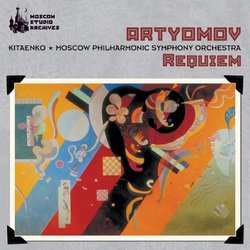Rex Tremendous
Discophage | France | 04/03/2010
(5 out of 5 stars)
"The vagaries of ex-Soviet copyright means that the same recording will appear repeatedly on different labels. This is the same recording as the one published in 2000 on the Boheme label Requiem - Vyacheslav Artyomov, which is how I have it. It is an awesome composition.
The name and music of Vyacheslav Artyomov (or Artiomov as it is sometimes spelled) lingered somewhere at the periphery of my consciousness. He doesn't appear to have reached the same kind of public recognition as some of his colleague composers emerged from the decaying Soviet Union - such as Schnittke, Gubaidulina and to a lesser extent Denisov and Silvestrov, as well as those composers from the outskirts of the Empire: Pärt, Tüür, Kancheli, Vasks (many of them thanks to the advocacy of Gidon Kremer). I had an early Mobile Fidelity CD from years ago, but what remained in my memory was a composer derivative of the Pärt-Gorecki school, writing neo-simplistic music with strong roots in folk and world music. Returning to that disc I realized that Artyomov (born in 1940) was more original and inventive than that, with a fine ear for instrumental color and a bent on music that probes deep into the ritualistic, even shamanistic (see my review of Artiomov:Way to Olympus or Vyacheslav Artiomov: Way to Olympus (Symphony for Large Orchestra, in One Movement) / Gurian Hymn, for 3 Solo Violins, Strings & Percussion / Invocation, for Soprano & 4 Players). So I decided to investigate more, and this was my first catch. And what a catch.
The Requiem, composed in 1986 (this recording was made during the rehearsals leading to the premiere performance in 1988) is a work of awesome power and endless fascination. Artyomov really takes the words at face value and sets them to music very graphically. The opening Requiem aeternam ("Grant them eternal rest, Lord") is gloom-and-doom-laden - a mood that Artyomov repeatedly employs (Dies Irae part 2, Recordare, Lacrimosa, Hostias et preces). Kyrie ("Lord have pity") and Dies Irae ("Day of wrath, day of anger") have a mob shouting as in a Christ Passion. That the lessons of the radical Penderecki (one of the composer's avowed influences, along with Varèse, Stockhausen, Messiaen, Berio's Sinfonia, Honegger's Symphonie liturgique) were heard and ingested can be heard at every bar - including in Artyomov's use of Orthodox chanting (track 9, Domine Jesu Christe).
As expected, the Tuba mirum has a few threatening fanfares, but the Rex Tremendae majestatis is whispered, as in awe ("King of tremendous majesty, who freely saves those worthy ones, save me"). The Confutatis ("When the accused are confounded and doomed to flames of woe, call me amongthe blessed") has blood-curling string glissandis over an obsessive bass tolling, as the cries of despair from the doomed, turning into violent orchestral and choral pounding with the returning words of the "Dies Irae" at 3:00. The Libera Me (track 14) is another such passage ("Deliver me, Oh Lord, from eternal death on that awful day when the heavens and earth shall be shaken"). The Requiem can hold up to Penderecki's Saint-Luke Passion and Utrenja; it has the same kind of impressive evocative and dramatic power.
But Artyomov's Requiem is not just all din. Unlike the radical Penderecki, Artyomov is also a master at writing beautiful melismatas, and (that's where the influence of the Pärt-Gorecki school perhaps can be heard) he doesn't shun the big lyrical gestures, as in track 4, part 2 of the Dies Irae and track 10, Hostias et preces - two more haunting gloom-and-doom moods, almost Poulenc-like (the Poulenc of the religious compositions) - or again in the baritone aria singing the Quaerens me ("faint and weary you have sought me, redeemed me, suffering on the cross") from the Recordare (track 6 at 1:50) - and it is Fauré's Requiem that comes to mind here. Artyomov can also conjure mysterious, dreamlike and haunting colors, for instance at 1:20 into the Recordare, track 6 (solo violin over obsessive punctuactions of bells - celesta maybe) or again in the Hosanna (3:10 into track 11) with its delicate tintinnabulating ostinato - the closest Artyomov gets to American minimalism. The quarter-tone glissandis in Hostias et preces (track 10) are also quite fascinating, and so are the drooping solo double bass glissandi in the Lux aeterna (4:20 into track 13 Agnus Dei). The Requiem ends "In Paradisum" with mysterious bird calls (flutes) and more crystalline tintinibulations.
The Requiem involves huge forces - three sopranos, tenor, baritone, organ, boy's choir (and an impressive and uncredited boy soprano in track 11, Sanctus), chorus and orchestra - and everybody seems entirely involved. The three sopranos are angelic. TT 76 minutes. Fine sound.
Artyomov is now certainly on MY map.
"


 Track Listings (15) - Disc #1
Track Listings (15) - Disc #1